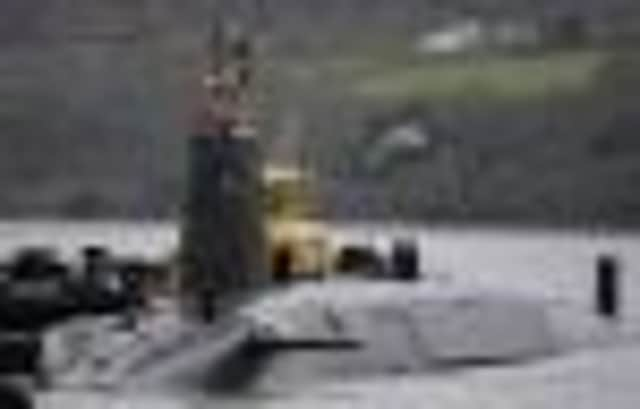Leaders: Complacency over our national security is not acceptable


According to defence minister Peter Luff, the reason is UK government confidence that the Scottish people will reject independence. It should be pointed out to Mr Luff that virtually everybody, including even the SNP itself, was confident that the party would not win an overall majority in last year’s Scottish parliamentary elections.
It now seems that should there be a vote for independence in 2014, the Ministry of Defence will be taken by complete surprise. At the very least, many people’s minds will suddenly be turned to the urgent task of assessing how Britain’s forces will be affected. That applies not just to the army, air force, and navy, but also to the intelligence services. Britain’s enemies, whoever they might be at that date, might well take that as a moment of weakness and seek to exploit the unexpected opportunity. No-one could tell what that might be, though one obvious possibility is that the Argentine government might consider it a good time to stop rattling sabres over the Falkland Islands and start to wield them.
Advertisement
Hide AdAdvertisement
Hide AdThere are major questions here. The SNP says it wants rid of the nuclear deterrent submarines from the Clyde. Can a nuclear deterrent be maintained if the weaponry suddenly has to be removed? Where else might the warheads be kept?
Nationalists might be delighted if such conundrums suddenly became real. But there are other less obvious questions that should also trouble them. Scots will want to know that they are secure against terrorist threat in an independent Scotland as it is known since the attack on Glasgow Airport that Scotland is not immune from such threats. How will the intelligence gathering which is essential to preventing these tragedies be carried out? Will there continue to be a UK intelligence service which, presumably, the Scottish Government would pay its share of the costs of? And what would be the political oversight and reporting channels for such a service? Or would there be no such shared service and Scotland left to invent its own?
There are also immediate issues over defence construction capacity. BAE Systems is said to be considering reducing its warship building capacity. If it was to close a yard in England only to have to reopen it because the rest of the UK government did not want to build ships in an independent Scotland, then it would be attacked by shareholders for its lack of foresight.
BAE is unlikely to accept UK ministerial complacency that there will be no independence; the MPs and peers on the national security committee are right not to accept it either.
Economic facts beg several questions
Whether Scotland pays its way within the UK is the hottest of political topics – and it has been for many years. The annual estimates of government expenditures and revenues in Scotland (GERS), published yesterday and the 18th of the series, is a statistical publication argued over like no other compendium of facts and figures.
This year, the SNP argues it shows that Scottish public finances, while in deficit, are in a less worse deficit than the equivalent UK fiscal balance. That statement, while statistically correct, masks a number of questions. The Scottish numbers only look better because of North Sea oil revenues, relatively high because of the relatively high price of oil. Looking ahead to possible independence, or fiscal autonomy, can Scotland rely on that continuing to be the case?
Even with high oil prices, the figures make it clear that there would have been no money in 2010-11 to put into an oil fund, a key SNP pledge. The deficit, including oil taxes, is 4.4 per cent of Scottish GDP, a figure which needs to be brought down to about 3 per cent before there could be any thought of an oil fund for future generations.
The figures also look good because the multi-billion cost of the bank bail-out is assumed to be spread across the whole UK population, with Scotland only taking its population share of 8.4 per cent. That is entirely reasonable, since the bail-out, while it rescued Scottish banks Royal Bank of Scotland and HBOS stabilised the whole UK financial system. But this leads to another crucial question: under independence, could Scotland similarly rely on the rest of the UK to fix a future Scottish banking crisis?
Rose Street must be allowed to bloom naturally
Advertisement
Hide AdAdvertisement
Hide AdRose Street in Edinburgh used to be a really fun place to walk along. Its many and varied pubs, cafes and restaurants claiming to present half the world’s cuisine, and shops ranging from expensive jewellers to cheap music boutiques meant that it was always thronged and lively. In the capital’s otherwise douce New Town, it was a slice of Bohemia.
But in recent times the crowds have thinned, the litter is more obvious and the ironmongery of street furniture too obvious. The shops are struggling and even the pubs, which could rely on endless visiting pub crawls, are finding things tough. So three cheers for the business group, the council, and Prince Charles’ architectural trust who are determined to turn round dank, dark, down-at-heel Rose Street and restore its liveliness. Deterring traffic, getting rid of some of the clutter and a spruce-up is all good, as is the idea to try and encourage fashion retailing to create a Carnaby Street atmosphere.
We do not think it should be planned. Space should be opened up for individuals to be cheaply creative. Carnaby Street arose, not from an architect’s drawing board, but from the eccentricity of a gay Glaswegian former welder’s apprentice’s desire to sell cheap clothing, to the pop art generation. From similar unexpected bizarreness, Rose Street can flourish again.